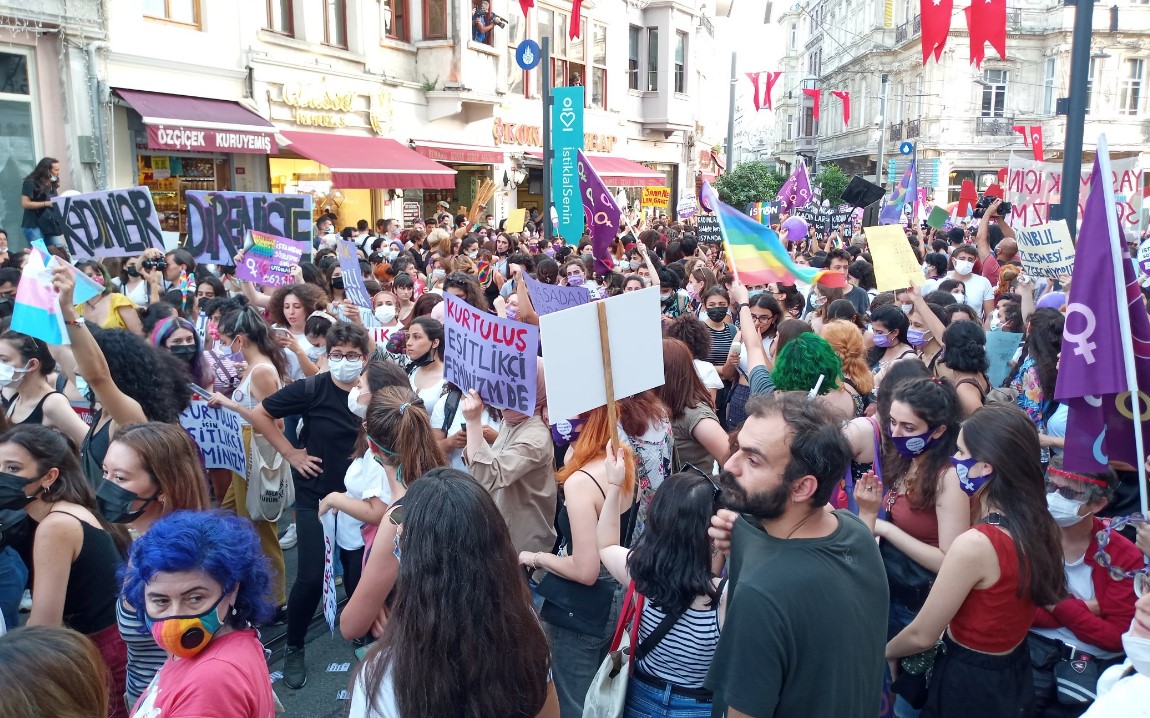Turkish President Recep Tayyip Erdoğan on Thursday defended Turkey’s withdrawal from an international treaty to combat violence against women, a move that has drawn condemnation from many Turks and rights groups, prompting protests across the country.
The Istanbul Convention, negotiated in Turkey’s biggest city and opened for signature in 2011, had as of 2019 been signed by 45 countries and the European Union, committing its signatories to preventing and prosecuting domestic violence and promoting equality.
Erdoğan sparked outrage in March by pulling out from the treaty, a decision that formally came into force today.
“Some circles are trying to portray our withdrawal from the Istanbul Convention as a step backwards in our battle with violence against women,” Erdoğan said during a speech in Ankara to present an alternative action plan.
“Our battle did not start with the Istanbul Convention, and it will not end with our withdrawal from the treaty,” he said.
Turkey’s highest administrative court on Tuesday rejected an attempt to annul the withdrawal, saying that Erdoğan had the “authority” to make the decision.
On Thursday thousands protested the decision across Turkey, where femicide has surged in recent years.
Demonstrators are now gathering at Tunel, on Istiklal caddesi, in protest of Turkey’s withdrawal today from the #IstanbulConvention to prevent violence against women. #İstanbulsözleşmesi pic.twitter.com/HcZT7RP5oD
— Diego Cupolo (@DiegoCupolo) July 1, 2021
One monitoring group has logged roughly one femicide per day in Turkey since a sharp rise five years ago.
Rights organizations say Erdoğan’s decision will put women at greater risk of violence when femicide is already prevalent in Turkey.
More scenes from Istiklal Caddesi near tunel right now. #istanbulconventuon #istanbulsoezlesmesi pic.twitter.com/VXacZj2FmF
— Diego Cupolo (@DiegoCupolo) July 1, 2021
Ankara’s withdrawal triggered condemnation from both the United States and the European Union, and critics say it puts Turkey even further out of step with the bloc that it applied to join in 1987.
Three opposition parties also pulled out of a parliamentary commission on Thursday to protest the decision.
Women’s rights groups accuse Ankara of withdrawing from the treaty to appease conservatives at a time when Erdoğan’s ruling Justice and Development Party (AKP) is recording lower levels of support.
“We will continue our struggle,” Canan Güllü, president of the Federation of Turkish Women’s Associations, said on Wednesday. “Turkey is shooting itself in the foot with this decision.”
She said that since March, women and other vulnerable groups had been more reluctant to ask for help and less likely to receive it, with COVID-19-fuelled economic difficulties causing a dramatic increase in violence against them.
Proponents of the convention and related legislation say more stringent implementation is needed.
The Turkish Industrialists and Businessmen’s Association (TÜSİAD) said in a written statement on Thursday that Turkey should turn back from the decision to withdraw from the convention.
However, many conservatives in Turkey and people supporting Erdoğan’s AKP say the pact undermines the family structures that protect society.
This month, Council of Europe Commissioner for Human Rights Dunja Mijatovic sent a letter to Turkey’s interior and justice ministers expressing concern about a rise in homophobic narratives by some officials, some of which targeted the convention.
“All the measures provided for by the Istanbul Convention reinforce family foundations and links by preventing and combating the main cause of destruction of families, that is, violence,” she said.
“The withdrawal sends a reckless and dangerous message to perpetrators who abuse, maim and kill: that they can carry on doing so with impunity,” said Amnesty International’s secretary-general, Agnes Callamard.
